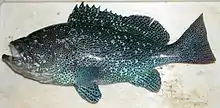| Pseudorhabdosynochus chauveti | |
|---|---|
| Scientific classification | |
| Domain: | Eukaryota |
| Kingdom: | Animalia |
| Phylum: | Platyhelminthes |
| Class: | Monogenea |
| Order: | Dactylogyridea |
| Family: | Diplectanidae |
| Genus: | Pseudorhabdosynochus |
| Species: | P. chauveti |
| Binomial name | |
| Pseudorhabdosynochus chauveti Sigura & Justine, 2008 | |
Pseudorhabdosynochus chauveti is a species of diplectanid monogenean that is parasitic on the gills of the blue grouper Epinephelus cyanopodus. It was described in 2008.[1]
Description
Pseudorhabdosynochus chauveti is a small monogenean, 300–600 µm in length. The species has the general characteristics of other species of Pseudorhabdosynochus, with a flat body and a posterior haptor, which is the organ by which the monogenean attaches itself to the gill of is host. The haptor bears two squamodiscs, one ventral and one dorsal. The sclerotized male copulatory organ, or "quadriloculate organ", has the shape of a bean with four internal chambers, as in other species of Pseudorhabdosynochus.[2]
The vagina includes a sclerotized part, which is a complex structure.[1]
Etymology
The name of the species chauveti honours Professor Chauvet "who provided fish host for the study".[1]
Hosts and localities

The type-host and only recorded host of P. chauveti is the blue grouper Epinephelus cyanopodus (Serranidae: Epinephelinae). The type-locality and only recorded locality is off Nouméa, New Caledonia. This grouper also harbours several other species of Pseudorhabdosynochus, namely P. cyanopodus, P. podocyanus, P. exoticus, P. duitoe, and P. huitoe, and a diplectanid belonging to a different genus, Laticola cyanus.[1] On the specimens of fish from off New Caledonia examined, P. chauveti was relatively rare, representing only 3.8% of the total number of monogeneans on the gills.[1]
References
- 1 2 3 4 5 Sigura, A.; Justine, J.-L. (2008). "Monogeneans of the speckled blue grouper, Epinephelus cyanopodus (Perciformes, Serranidae), from off New Caledonia, with a description of four new species of Pseudorhabdosynochus and one new species of Laticola (Monogenea: Diplectanidae), and evidence of monogenean faunal changes according to the size of fish". Zootaxa. 1695: 1–44. doi:10.11646/zootaxa.1695.1.1.
- ↑ Kritsky, D. C. & Beverley-Burton, M. 1986: The status of Pseudorhabdosynochus Yamaguti, 1958, and Cycloplectanum Oliver, 1968 (Monogenea: Diplectanidae). Proceedings of the Biological Society of Washington, 99, 17-20. PDF
